
| WWT Shows | CLICK TO: Join and Support Internet Horology Club 185™ | IHC185™ Forums |

|
• Check Out Our... • • TWO Book Offer! • |
Welcome Aboard IHC185™  Internet Horology Club 185
Internet Horology Club 185  IHC185™ Discussion Site Main Page
IHC185™ Discussion Site Main Page  Horological Discussions, Questions and Answers
Horological Discussions, Questions and Answers  Pocket Watch Discussions
Pocket Watch Discussions  18 size Howard
18 size Howard
 Internet Horology Club 185
Internet Horology Club 185  IHC185™ Discussion Site Main Page
IHC185™ Discussion Site Main Page  Horological Discussions, Questions and Answers
Horological Discussions, Questions and Answers  Pocket Watch Discussions
Pocket Watch Discussions  18 size Howard
18 size HowardGo  | New Topic  | Find-Or-Search  | Notify  | Tools  | Reply to Post  |  |
| IHC Member 155 Bulova Watchmaker |
I am hoping that some of you pocket watch enthusiasts can give me some information on this old Howard. I believe it is a model VIII 18 size 15 jewels. I know the case is well worn and the nickel bow is not right. My memory tells me that Howard’s of this type had to be in a special case? I have a full set of pictures and would appreciate all the information I can get. I know how to fix them but have always concentrated on wristwatches. My knowledge on Howard’s and there history probably could not cover a pinhead. This one has some incorrect screws some polished and some blued. I think they should be blued from this era is that correct. Thank you all for your concern and emails. My eyes are improving and each day gets a little better. 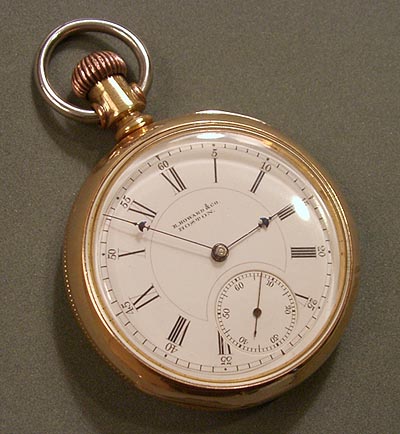 | ||
|
| IHC Member 155 Bulova Watchmaker |
picture 2 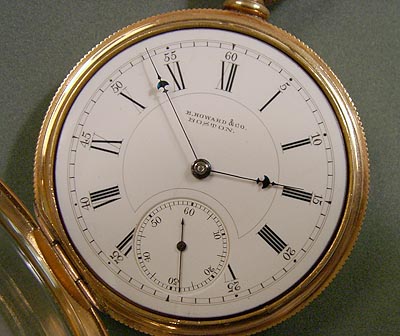 | |||
|
| IHC Member 155 Bulova Watchmaker |
picture 3 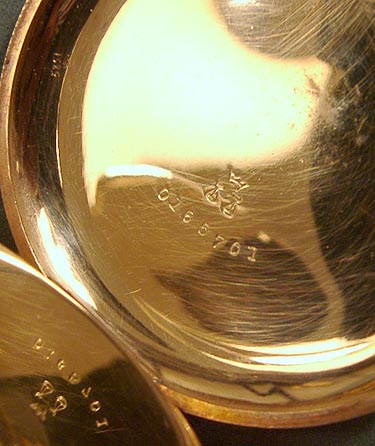 | |||
|
| IHC Member 155 Bulova Watchmaker |
picture4 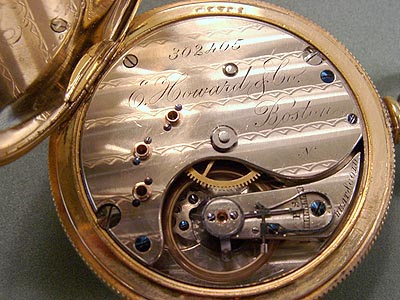 | |||
|
| IHC Member 155 Bulova Watchmaker |
picture 5 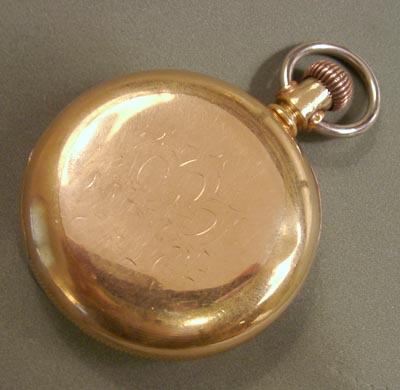 | |||
|
| IHC Member 155 Bulova Watchmaker |
picture 6 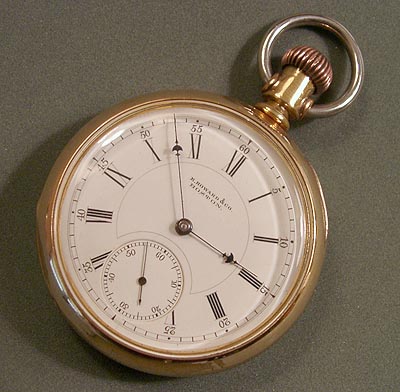 | |||
|
| IHC Member 179 E. Howard Expert |
Hello Rich, your watch is a series VIII one of 8420 made. It was finished March 3,1887 and is a Grade #5; Adjusted to Heat&Cold and Isochronism. One of the non blued pillar plate screws is wrong, but the case screws appear to be correct. The E. Howards do require a case specifically made to fit a E. Howard movement. Most Howard collectors shy away from a gold-filled cased Howards myself included, but I have seen numerous ads from that time frame that offered gold-filled cases for a movements like yours. Normally a re-cased watch would show a stem detent screw in the pendant, a Howard has the screw in the movement, or a cutout for the lever set would be another clue that it's a recase. Your example shows neither of these. Does it have the movement dust ring present? It appears to fit in the case properly, but without holding it in my hand, I can not say for sure whether or not it is an original case. The case screws do not appear to screw down on the ledge properly, but then again it's hard to tell from the picture. Is there any evidence of extra case screw marks? That's about all I can offer you, hope it helps. Harold NAWCC #130847 Member Chapter 112, 174, 185 | |||
|
| IHC Member 155 Bulova Watchmaker |
Harold, Thank you for the information. The movement does have the dust ring and I see no extra screw marks on the case. I am quite sure this case has not seen another movement. I have had the movement out of the case but have not had the movement apart so I don't know if anything is wrong under the dial. It runs well, keeps time and sets properly so I have not cleaned it. Rich Kuhn IHC Member 155 | |||
|
| IHC President Life Member |
Thanks for helping Rich out Harold! Rich, You might want to ask Harold or perhaps Ray Tyulty about finding the blued, dome-top screws you need. They'd improve the look of the movement tremendously. I sure love the dial and hands! Lindell | |||
|
I like that look: an arc of the dial’s inner circle that’s concentric to the seconds circle. Does that configuration always indicate a drawn inner circle, or might it be sunk? Stu Goldstein IHC Member 19 | ||||
|
| IHC Member 179 E. Howard Expert |
Hello Stu, Howard didn't start using double sunk dials until the split-plate models were produced, starting in Nov.1894, with the exception of a few later factory made replacement dials, some of which were true double sunk dials. So yes, the drawn inner circle on the dial in question is a single sunk version. Harold | |||
|
Thanks Harold! Did other makers besides Howard produce dials with the nifty concentric arrangement? Were any double-sunk? Stu Goldstein IHC Member 19 | ||||
|
| IHC Life Member RR Watch Expert |
Stu, The printed circle inside the hour numerals were used by a number of companies. I have seen both Elgin and Waltham dials made this way, but the ones I see most were made by Hampden. Since the printed circle was used to "simulate" a double sunk dial without the extra expense, these dials are single sunk. Ed Ueberall IHC Member 34 The Escapement | |||
|
Thanks Ed! I think it’s curious that circles printed inside the hour numerals like on the Howard dial above, although apparently designed to simulate double sunk dials, are concentric to the seconds circle, while the circles inside the hour numerals on true double sunk dials like Fred Hansen’s pictured here are confluent (not concentric) with the seconds circle. Stu Goldstein IHC Member 19 | ||||
|
Harold: I have a series IV Howard #48980. It is in a Dueber 18K case. No other watch has been in the case,there is no screw in the pendant and no cutout for a lever. The shape would be what I think is descibed as drum shaped, a flat appearance. However some so called Howard experts insist that Dueber did not make Howard cases for series IV watches. The case was certainly made for a Howard, but is it possible to tell if the case is original to the watch? Jerry Freedman | ||||
|
| IHC Member 179 E. Howard Expert |
Hello Jerry, Your Howard was transferred to the New York office to be sold in July of 1883. From what you have told me so far and if the case screws cover the "ledge" properly and the movement fits snugly with the dust band on and if the dial side fit appears proper, than I would say without a doubt that you own an original E. Howard SERIV. Regards, Harold | |||
|
Harold: The movement fits nicely in the case, and the case screws do cover the edge. Now I guess I have to take the movement out and check for the dust cover. Thanks for the reply. | ||||
|
| E. Howard Expert |
Hello All, It would have been absolutely inexplicable if a major casemaker like Dueber would not have made at least a few cases for the movements of a prestigous watch manufacturer like Howard. I have seen at least a few original Dueber-made Howard cases over the years. | |||
|
| Powered by Social Strata |
| Your request is being processed... |
|
©2002-2025 Internet Horology Club 185™ - Lindell V. Riddle President - All Rights Reserved Worldwide

